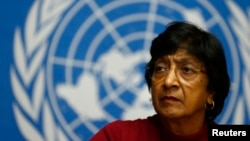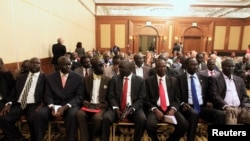GENEVA, SWITZERLAND —
A mass grave containing some 75 bodies has been found in South Sudan's Unity State and two other mass graves have been reported in the capital Juba after ethnic violence, the United Nations said on Tuesday.
U.N. High Commissioner for Human Rights Navi Pillay called on both sides to protect civilians and warned that political and military leaders could be held to account for crimes.
"Mass extrajudicial killings, the targeting of individuals on the basis of their ethnicity and arbitrary detentions have been documented in recent days," Pillay said in a statement. "We have discovered a mass grave in Bentiu, in Unity State, and there are reportedly at least two other mass graves in Juba."
President Salva Kiir and rebel leader Riek Machar, his former deputy, have both indicated they were ready to talk to try to end a deepening conflict that has killed hundreds of people since it erupted this month.
Western powers and east African states, anxious to prevent the fighting from destabilizing a particularly fragile region, have tried to mediate between Machar, who hails from the Nuer tribe, and Kiir, a Dinka.
Spokeswoman Ravina Shamdasani said that the bodies of 75 soldiers of the Sudan People's Liberation Army were believed to be in the mass grave in Bentiu visited by U.N. rights officers.
"They are reportedly all of Dinka ethnicity," Shamdasani told Reuters in Geneva, adding that the U.N. team had been unable to verify the numbers or identities.
U.N. rights officers had not yet been able to visit the sites of two other mass graves, Jebel-Kujur and Newside, near Eden, both in Juba, she said.
Pillay, a former U.N. war crimes judge, voiced deep concern about the safety of those arrested who are being held in unknown locations, including "several hundred civilians who were reportedly arrested during house-to-house searches and from various hotels in Juba".
Hundreds of members of the South Sudan National Police Service were allegedly ordered to be disarmed and arrested from police stations across Juba, she said.
U.N. Secretary-General Ban Ki-moon sought urgently on Monday to nearly double the size of the U.N. peacekeeping force in the country.
U.N. High Commissioner for Human Rights Navi Pillay called on both sides to protect civilians and warned that political and military leaders could be held to account for crimes.
"Mass extrajudicial killings, the targeting of individuals on the basis of their ethnicity and arbitrary detentions have been documented in recent days," Pillay said in a statement. "We have discovered a mass grave in Bentiu, in Unity State, and there are reportedly at least two other mass graves in Juba."
President Salva Kiir and rebel leader Riek Machar, his former deputy, have both indicated they were ready to talk to try to end a deepening conflict that has killed hundreds of people since it erupted this month.
Western powers and east African states, anxious to prevent the fighting from destabilizing a particularly fragile region, have tried to mediate between Machar, who hails from the Nuer tribe, and Kiir, a Dinka.
Spokeswoman Ravina Shamdasani said that the bodies of 75 soldiers of the Sudan People's Liberation Army were believed to be in the mass grave in Bentiu visited by U.N. rights officers.
"They are reportedly all of Dinka ethnicity," Shamdasani told Reuters in Geneva, adding that the U.N. team had been unable to verify the numbers or identities.
U.N. rights officers had not yet been able to visit the sites of two other mass graves, Jebel-Kujur and Newside, near Eden, both in Juba, she said.
Pillay, a former U.N. war crimes judge, voiced deep concern about the safety of those arrested who are being held in unknown locations, including "several hundred civilians who were reportedly arrested during house-to-house searches and from various hotels in Juba".
Hundreds of members of the South Sudan National Police Service were allegedly ordered to be disarmed and arrested from police stations across Juba, she said.
U.N. Secretary-General Ban Ki-moon sought urgently on Monday to nearly double the size of the U.N. peacekeeping force in the country.






